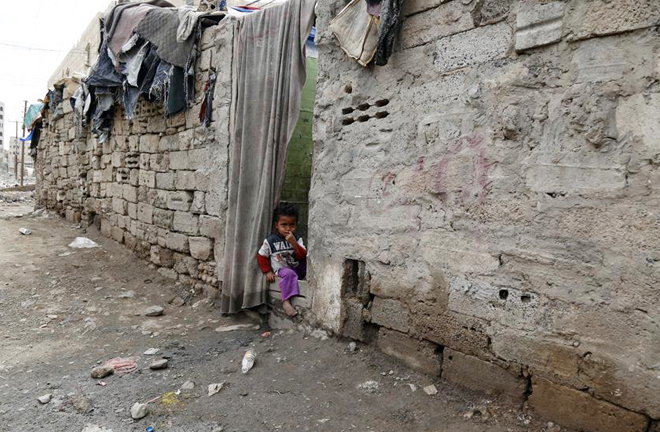Academics urge aid to developing nations amid COVID-19 pandemic

A child sits in front of his family’s hut in a slum in Sanaa, Yemen, April 20. David Beasley, executive director of the World Food Programme, recently warned of a “hunger pandemic” in tandem with the COVID-19 pandemic across the globe. Photo: Mohammed Mohammed/XINHUA
Scholars are calling on the international community to provide more support to developing countries, which are particularly vulnerable to the COVID-19 pandemic currently spreading across the globe.
Developing countries are considerably vulnerable in the face of COVID-19, said Sara M. Allinder, senior associate of the CSIS Global Health Policy Center in the US. For instance, rural residents lack access to clean water and sanitation, and social distancing is difficult to implement in densely populated mega cities. In addition, health systems are already at capacity in many developing countries, especially where existing epidemics of HIV, tuberculosis, malaria and other infectious diseases are common.
According to David Evans, a senior fellow at the Center for Global Development in the US, low- and middle-income countries generally have higher proportions of poor people and fewer government resources to adequately support vulnerable citizens when health and economic crises occur. As a result, COVID-19 is likely to have significant economic and public health impacts on developing countries.
In terms of economic impact, Allinder noted that developing countries are less resilient to disruptions in the global supply chain, decrease in demand and tourism stagnation.
To mitigate the economic impact, two key tasks are to protect employment and to protect the poorest populations, Evans said. The latter can take various forms. Cash transfers are a simple way to do this, especially when systems for this are already in place. In addition, financial institutions should loosen their credit terms to help companies weather the storm.
Emerging markets and the least developed countries need to immediately come up with a plan to fight COVID-19. But problematically, the latter group have the weakest infrastructure and the poorest populations, many of which will starve and fall into extreme poverty if they lose their jobs, Evans noted. Without government support, some of the anti-coronavirus strategies used in emerging markets will be hard to carry out in the least developed countries. Thus, Evans said, the international community needs to “actively help the least developed countries so that they can focus on fighting the spread of the disease.”
Allinder mentioned that the international community is already offering financial resources to developing countries, and loan and debt forgiveness is also on the table. That is very important.
Capacity should be built in developing countries to ensure the production and distribution of COVID-19 therapeutics and vaccines once developed and approved, Allinder continued. The international community should lean into its support for the Global Health Security Agenda. Developing countries should put greater shares of their budgets toward healthcare. Donor countries can help support these efforts through a global health security fund that can pull together public and private international financing.
Ralph Hamann, a professor from the Graduate School of Business at the University of Cape Town in South Africa, said that the international community should give financial support to governments, aid organizations and NGOs in developing countries to deliver food to where it is needed. Some governments have responded to COVID-19 by temporarily closing or slowing cross-border trade in food and other essential items. This is likely to impact the poorest countries heavily. The international community must make sure that global trade networks remain functioning, especially in food and basic necessities.
“The international community should recognize that COVID-19 is severely impacting developing countries and this will have global consequences,” Hamann said. To alleviate the problem, massive financial resources must be channeled to developing countries through existing institutions such as the World Bank, the International Monetary Fund and the New Development Bank.
edited by JIANG HONG
